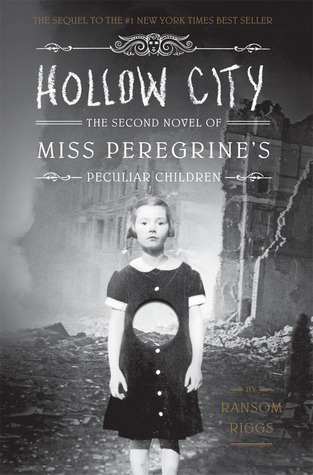Hollow City
By: Ransom Riggs

The extraordinary journey that began in Miss Peregrine's Home for Peculiar Children continues as Jacob Portman and his newfound friends journey to London the peculiar capital of the world. But in this war-torn city, hideous surprises lurk around every corner. Like its predecessor, this second novel in the Peculiar Children series blends thrilling fantasy with never-before-published vintage photography to create a one-of-a-kind reacting experience.
I waited a couple days to write this review because I wanted to fully process all my thoughts concerning this fantastic book. I really liked Miss Peregrine's Home for Peculiar Children. I thought it was innovative and inventive. It was a whole new way of storytelling unlike anything I'd ever seen before. That being said, the pace toward the beginning of that one was a bit slow for me, but there was a lot to build up in the world. This book blew me away, it grabbed me from the first page and refused to let go. The action didn't stop, the writing was beautiful, and the method of storytelling was just as brilliant as in the first book.
Characters:
Thomas: You can see his development so clearly from the first book to this one. He's getting braver, even though he doesn't see it himself. He's learning more about his peculiarity, his power, himself. It's really great to watch. I love his relationship with Emma, she makes him a better version of himself. I loved his interaction with the other kids, too.
The Other Peculiar Kids: It took me a bit into the book to get all of the boys' names straight (particularly Horace, Millard, and Hugh), but I loved all of them. They were funny, smart, and brave. They each had distinct personalities that showed in the larger group setting.
I have to say that I think my personal favorite is Horace (or at least he's tied with Bronwyn and Hugh and Millard. I just like them all, okay?). He's always so funny.
"She's in the drawer," said Horace.
Mr. White's unibrow knit together. "The drawer. What drawer?"
"Same one she's always been in." said Horace.
He shood Horace by the jaw and shouted, "What drawer?!"
...Then his eyes came open and he look hard into Mr. White's and said, "Your mother's knickers drawer," and he spat right in Mr. White's face."
^^^ This was possibly my favorite moment in the entire book. I laughed out loud, thankfully not in public.
Caul: Crud, he's scary! I am not looking forward to getting to know him any more than we have, but I will say that he's a extremely intriguing villain.
Plot:
The plot of the series really took a running start in this book. Miss Peregrine's worked to set up the world, but this book really began exploring it. We saw other loops, other children, other ymbrynes. We saw more wights and hollowgasts. We saw other times, more of 1940, even the present briefly. This world is thoroughly developed now and expanding. I personally am so excited to experience the expansion.
Writing:
Ransom Riggs writes a mean sentence. How he described the scenery and even the most commonplace things were gorgeous. His language almost feels old-fashioned at times, which really plays into the themes and settings of the book. His writing feels peculiar, so the world feels peculiar (as opposed to the world feeling all modern or all historical, it's ends up a mix of both).
Quotes:
"Just because they knew it was lost didn't mean they knew how to let it go."
"What felt like an obligation now had been a promise back then..."
"Some truths are best expressed in the form of a myth."
"In that moment I was deeply grateful...for the simplemindedness of the animal part of my brain; that a hot meal and a song and a smile from someone I cared about could be enough to distract me from all that darkness, if only for a little while."
"Strange, I thought, how you can be living your dreams and your nightmares at the very same time."
"I liked this idea: that peculiarness wasn't a deficiency, but an abundance; that it wasn't we who lacked something normals had, but they who lacked peculiarness. That we were more, not less."
"But you can't feel bad every second, I wanted to tell her. Laughing doesn't make bad things worse any more than crying makes them better. It doesn't mean you don't care, or that you've forgotten. It just means you're human."
No comments:
Post a Comment